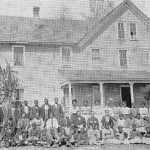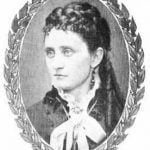
The Choctaw Freedmen and the story of Oak Hill Industrial Academy, Valliant, McCurtain County, Oklahoma, now called the Alice Lee Elliott memorial, included the early history of the five civilized tribes of Indian Territory, the presbytery of Kiamichi, synod of Canadian, and the Bible in the free schools of the American colonies, but suppressed in France, previous to the American and French revolutions.
The aim of the Author in preparing this volume has been to put in a form, convenient for preservation and future reference, a brief historical sketch of the work and workers connected with the founding and development of Oak Hill Industrial Academy, established for the benefit of the Freedmen of the Choctaw Nation, Indian Territory, by the Presbyterian Church, U. S. A., in 1886, when Miss Eliza Hartford became the first white teacher, to the erection of Elliott Hall in 1910, and its dedication in 1912; when the name of the institution was changed to “The Alice Lee Elliott Memorial.”
General Facts
- Opening of Indian Territory
- Indian Schools
- Doaksville and Fort Towson
- The Bible, An important factor in Civilization
- The American Negro
- “Problem of the Negro”
- Voices from the Black Belt
- Uplifting Influences
- The Presbyterian Church
- The Presbyterian Freedman’s Board
- Special Benefactors
Oak Hill Industrial Academy
- Native Oak Hill School
- Era of Eliza Hartford
- Early Reminiscences of Oak Hill Academy
- Early Times at Forest Chapel
- Era of Supt. James F. McBride
- Era of Rev. Edward G. Haymaker
- Buds of Promise 1884-1904
- Oak Hill Industrial Academy Closed in 1904
- Reopening and Organization of Oak Hill Academy
- The Oak Hill Academy Prospectus in 1912
- Obligation and Pledges
- Bible Study and Memory Work
- Decision Days
- The Self-Help Department
- Industrial Education
- Permanent Improvements to Oak Hill Industrial Academy
- Elliott Hall
- Unfavorable Circumstances
- Building the Temple
- Success Maxims and Good Suggestions
- Rules and Wall Mottoes
- Savings and Investments
- Summer Normals
- The First Chautauqua
- Graces and Prayers
- Presbyterian Meetings and Picnics
- Farmer’s Institute
- Farm Life at Oak Hill Industrial Academy
- Oak Hill Aid Society
- Tributes to the Workers
- Biography of Mary A. Flickinger
- Biography of Bertha Louise Ahrens
- Biography of Adelia M. Eaton
- Biographical Sketch of Mrs. John Claypool
- Biography of Mary I. Weimer
- Biography of Malinda A. Hall
- Biographical Sketch of Jo Lu Wolcott
- Biography of Solomon H. Buchanan
- Biographical Sketch of Mary A Donaldson
- Oak Hill Industrial Academy Closing Day, 1912
The Presbytery and Synod
- Presbytery of Kiamichi
- Histories of Presbyterian Churches
- Biography of Parson Charles W. Stewart
- Biography of Rev. Wiley Homer
- Biographical Sketch of Rev. Plant Senior Meadows
- Biography of Rev. William J. Starks
- Biography of Rev. Thompson K. Bridges
- Biographical Sketch of Rev. Samuel Gladman
- Biographical Sketch of Rev. Richard D. Colbert
- Biography of Rev. William Butler
- Other Ministers and Elders
- Synod of Canadian
- The Bible In The Public School
The allotment of lands in severalty to the Indians and Freedmen was completed in 1905, and the Territorial government was transformed into one of statehood on Jan. 1, 1908. The progress of their civilization, that made it possible for the Indians in the Territory to become owners and occupants of their own homes, supporters of their own schools and Churches and to be invested with all the powers and duties of citizenship, is briefly reviewed in the introductory chapters.

The author has endeavored to make this volume one easily read and understood by the Choctaw Freedmen, in whose homes it is expected to find a place, and be read with interest and profit many years.
He has done what he could to enable as many of you as possible to leave the impress of your personality on the world, when your feet no longer move, your hands no longer build and your lips no longer utter your sentiments.
The hope is indulged that every pupil of the Academy, whose portrait has been given an historic setting in this volume, will regard that courteous recognition, as a special call to make the Bible your guide in life and perform each daily duty nobly and faithfully, as though it were your last.
A life on service bent,
A life for love laid down,
A life for others spent,
The Lord will surely crown.
Whilst other denominations have rendered conspicuous and highly commendable service in the effort to educate and evangelize the Indians and Freedmen, in this volume mention is made only of the work of the Presbyterian Church. This is due to the fact the Presbyterian Church, having begun missionary work among the Choctaws at a very early date, it was left to pursue it without a rival, in the particular section of country and early period of time included in the scope of this volume.
Such as it is, this volume is commended to him, whose blessing alone can make it useful, and make it to fulfill its mission of comfort and encouragement, to the children and youth of the Freedmen who are sincerely endeavoring to solve the problem of their present and future destiny.
Fonda, Iowa, March 15, 1914.
R. E. F.
